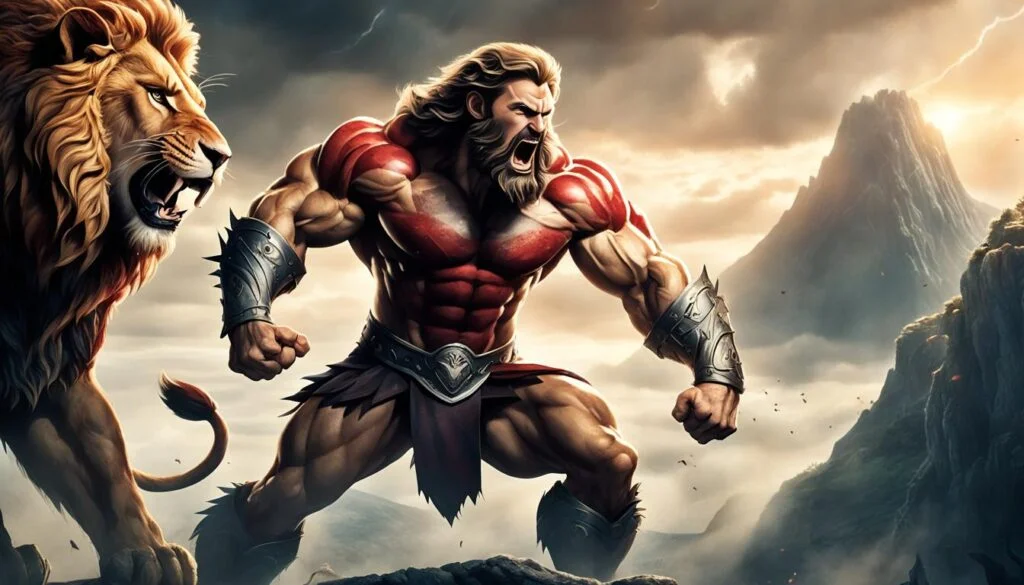In the world of Greek heroes, Hercules stands out. He was known and celebrated for his unmatched strength and his brave adventures.
Hercules’ story is fascinating, filled with divine help, daunting tasks, and valor beyond measure.
What makes him interesting is that he was not a god but a son of Zeus, the mightiest god. His mother descended from another famous hero, Perseus, connecting him deeply to ancient tales.
Hercules faced twelve incredibly difficult challenges, known as the Twelve Labors. They were both tests of his mighty power and a way to earn forgiveness.
A curse from Hera, Zeus’ wife, caused him to do terrible things. This included a dark time when he unknowingly killed his family out of madness.
But he didn’t let these mistakes define him, facing each Labor bravely.
Key Takeaways
- Hercules is the Roman equivalent of the Greek hero Heracles.
- Despite his godly strength, Hercules was born mortal to Zeus and Alcmene.
- The Twelve Labors were performed to atone for sins induced by Hera’s madness.
- Hercules’ saga includes battling formidable creatures like the Nemean Lion and the Cretan Bull.
- Ultimately, Hercules achieved immortality and ascended to Mount Olympus.
Introduction to Hercules: The Greek Demigod
In Greek mythology, Hercules is a celebrated hero known for his unbeatable strength and exciting adventures.
He’s a demigod, meaning he had powers from his godly father and his human mother.
Hercules’ Parentage: Zeus and Alcmene
His story starts with Zeus, king of the gods, and Alcmene, a beautiful and virtuous mortal.
Their son Hercules gained his might from this divine and human mix.
However, Zeus’ wife, Hera, was angry at Hercules due to his birth from Zeus’ affair. She plotted against him his entire life, bringing intense challenges.
Early Life and Challenges
As a baby, Hercules had to fight off huge snakes sent by Hera to kill him. He is said to have killed the snakes by hand, showing great power even as a child.
These early challenges were only the beginning. Hercules’ life was full of tough tasks and adventures.
An example is his famous Twelve Labors, which tested his strength and bravery.
Who Was Hercules: Understanding The Hero’s Identity
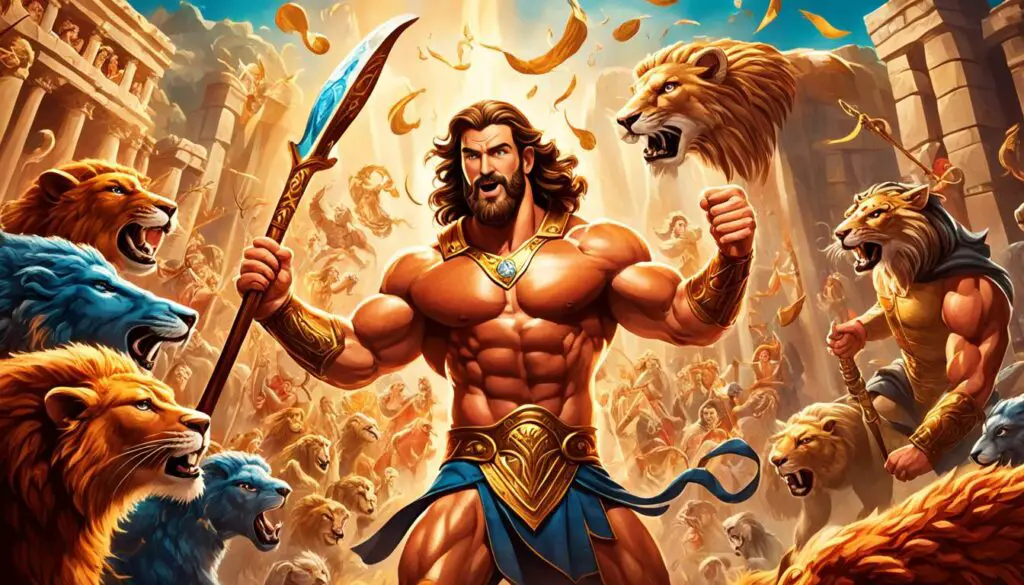
Hercules is famous for his amazing deeds and his godly roots. He went from being a part-god to a fully-godly being of strength.
This transformation is a compelling part of his story. It shines a light on the key themes of heroism, tragedy, and ultimate victory.
Hercules’ tale is a standout in ancient mythologies for these reasons.
Hercules in Greek and Roman Mythology
Hercules’ story starts with his birth to Zeus and Alcmene, making him half-human, half-god. The Greeks call him Heracles, and the Romans, Hercules.
Both sets of myths celebrate his exceptional abilities. His feats, especially the Twelve Labors, demonstrated not just his strength but his willpower too.
Symbolism and Attributes
In art, Hercules is often seen with a lion’s skin, a club, or a bow and arrows. These symbols tell stories in themselves.
For instance, the lion’s skin from his victory over the Nemean Lion is a sign of his bravery and power. He was known for his incredible physical strength, which surpassed many gods.
His skills in combat, using weapons and his bare hands, were extraordinary. Hercules was not just strong but very tough.
His body could take on powerful blows, yet he could heal quickly too. Even in space, he could survive for a while.
His weapon choices were vast, from the Golden Mace to a bow and arrow. In some legends, he’s shown using big clubs.
His fights were with tough foes like Pluto and Athena. Yet, he always came up with strategies to win.
But Hercules was more than just a fighter. His story tells us that even the strongest face tough battles.
It paints a picture of a hero who is both mighty and vulnerable. His legend teaches us about bravery and human struggle.
The Birth and Early Years of Hercules
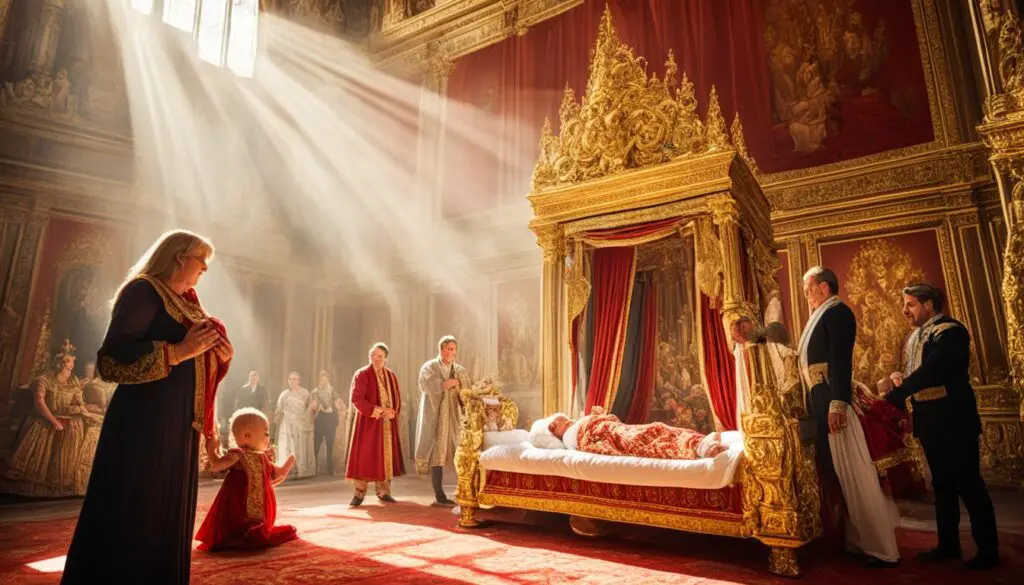
The story of Hercules mixes gods and humans in a special way. It starts with Amphitryon, who accidentally kills Electryon, his father-in-law.
Zeus takes the form of Amphitryon and has a child with Alcmene, Hercules (initially called Alcides). The next day, Alcmene has another son, Iphicles.
Hercules’ baby life is not easy. Hera, who is Zeus’s wife, tries to stop his birth because she knows he’s Zeus’s son. Alcmene still has Hercules, a child of great destiny.
Right after he is born, Hercules is in danger. His mother leaves him in a field to protect him from Hera’s anger.
Athena, his half-sister, saves him and takes him to the gods’ home, Mount Olympus. There, Hera tries to feed him with her milk, which spills into the sky and creates the Milky Way.
This event shows Hercules is special and chosen by the gods.
Early on, Hercules shows he is very strong. At just eight months old, he kills two serpents. These were sent by Hera to end his life.
This act hints at his future as a great hero, one who will face and defeat dangerous creatures. A seer, Tiresias, predicts Hercules will have many incredible adventures.
These early events shape Hercules into the famous hero he becomes. His godly parentage and early challenges show he is not an ordinary person.
Hercules is a hero from birth, set for amazing deeds by both his human mother Alcmene and his divine father Zeus.
Hercules and Hera: A Legendary Conflict
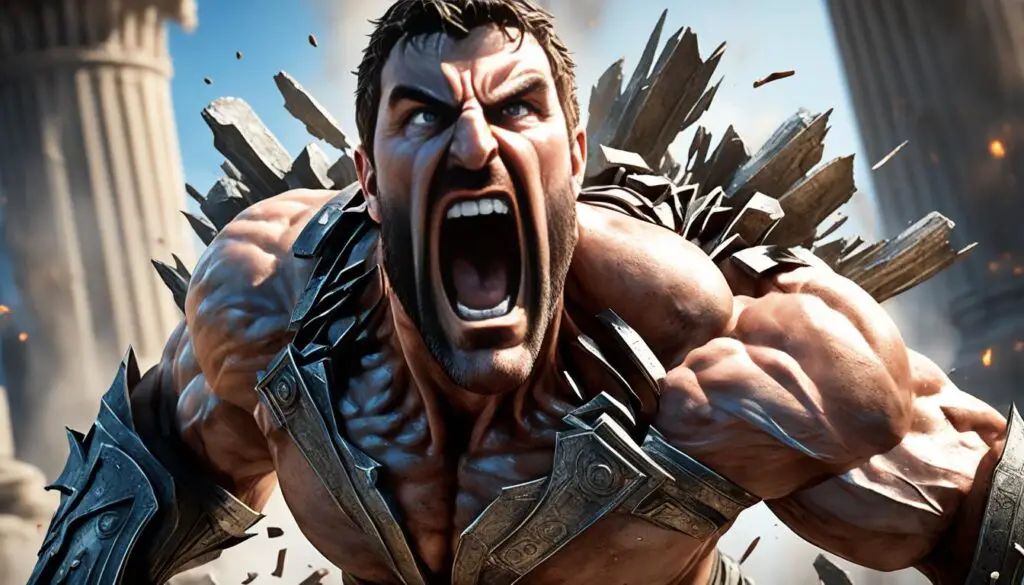
The story of Hercules and Hera stands out in Greek mythology. It’s a story of jealousy and strength. It all started with Hera’s jealousy of Zeus’s affair.
This affair led to Hercules’ birth, setting the stage for a life of challenges.
Hera’s Attempts on Hercules’ Life
Before Hercules was born, Hera tried to stop him. She used a goddess to delay his birth. Even as a newborn, Hercules faced and defeated her attempts when she sent serpents into his crib.
This proved his strength and hinted at his divine nature. Despite Hera’s jealousy, each failure showed Hercules’ resilience.
The Madness Induced by Hera
Hercules madness is a heartbreaking part of his tale. Hera pushed him to madness, leading him to mistakenly kill his family.
This act haunted him. But, it started a journey of regret and self-redemption. He later atoned for his actions by completing the Twelve Labors for King Eurystheus.
The struggle between Hercules and Hera is more than a fight between gods and a demigod. It reflects the push and pull of fate.
Despite the suffering, Hercules’ story is a beacon of hope and strength. It’s about overcoming the impossible. This tale shows how divine and human actions can shape destiny together.
The Hero’s Early Adventures
Hercules started his adventures with tests that defined him as a hero. These early challenges showed his strength and helped him rise to fame.
They also revealed the tough obstacles he overcame right from the beginning.
Victorious War Against Orchomenus
Hercules had a big win over Orchomenus that made him famous. This fight proved his great skills and leadership.
Chris Vogler’s story based on Joseph Campbell shows that Hera’s threats pushed Hercules to face his enemies.
This made him into the hero we know. For more on his struggles, check out Hercules’s life and labors.
Marriage to Megara and the Tragedy
Hercules found love and family with Megara. But Hera made him go mad and he killed his family.
This event marked by Hera’s cruelty pushed Hercules into a journey of guilt and redemption.
This led him to complete the twelve labors, making him a true hero. You can read more about this on the comprehensive history of Hercules.
The tragedy shows how the gods interfered with human lives. It also marked the beginning of Hercules’ long path to forgiveness.
To understand more about Hercules’ journey, look at the stages of a hero’s journey in Hercules’s.
The Twelve Labors of Hercules
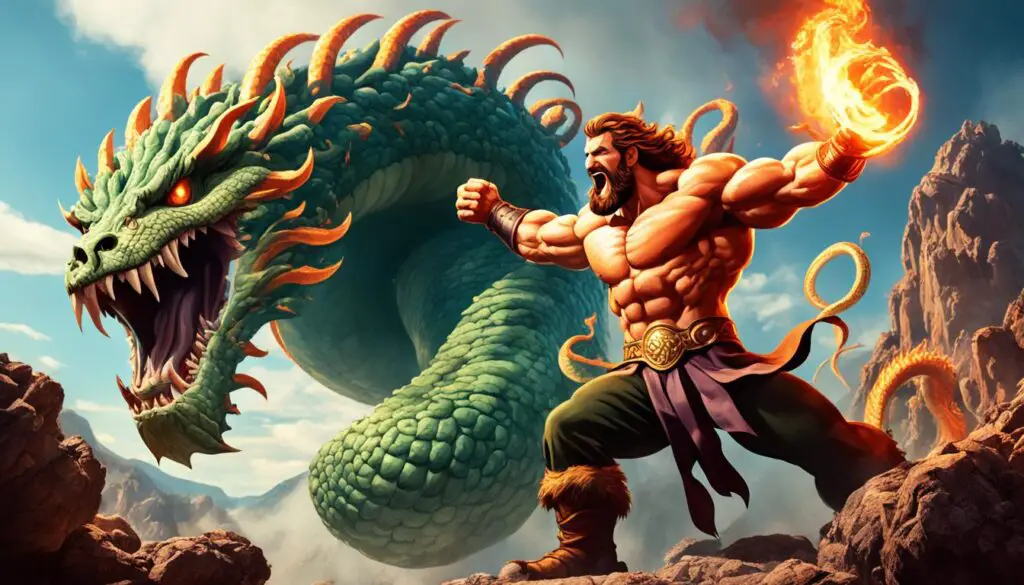
Hercules was asked to perform twelve hard tasks by King Eurystheus. These tasks aimed to test Hercules’ might, brains, and stamina.
At first, there were ten tasks, but they became twelve. Each challenge was full of danger and required smart solutions.
The Nemean Lion
Hercules’ first labor was to kill the Nemean Lion. This lion couldn’t be hurt by normal weapons. Instead of fighting it head-on, Hercules strangled it.
He then used the lion’s skin as impenetrable armor.
The Lernaean Hydra
His second job was to defeat the Hydra, a many-headed snake. Hercules cut off its heads. To stop them from growing back, he burnt the neck stumps.
He also buried its immortal head under a heavy rock.
The Golden Hind of Artemis
Then, Hercules was told to catch a special deer. This deer was sacred and very fast. After a year of chasing it, he caught it without hurting it.
This showed his amazing patience.
The Erymanthian Boar
Next, Hercules needed to grab a big, mean boar. He outsmarted it by driving it into snow. Once trapped, he took it back alive.
This was his fourth task.
The Augean Stables
Task five was cleaning incredibly dirty stables in just one day. Hercules changed the stables’ location.
He made two rivers flow through them, cleaning them fast. But later, he was told he shouldn’t have taken a reward for this job.
The Stymphalian Birds
Then, he was up against flesh-eating birds. Athena helped by giving him a rattle. Hercules used it to scare the birds and then shot many of them down.
This made the lands safe again.
The Cretan Bull
For his seventh job, Hercules had to catch a crazy bull that was causing trouble. He managed to grab it bare-handed.
After catching it, he released it to do as it pleased.
The Mares of Diomedes
He was then asked to calm down some horses that ate people. It was a brutal challenge, his friend Abderus got killed.
Despite this, Hercules caught the horses and brought them to Eurystheus. This showed his unmatched willpower.
The Belt of Hippolyte
Hercules’ ninth task was to get the belt of the Amazon Queen. The mission was peaceful at first, but a god stirred up a fight.
Even so, Hercules won the belt in the end.
The Cattle of Geryon
He then had to bring back some special cows from the end of the world. He defeated a giant to do this.
After winning, he safely returned the cows.
The Apples of the Hesperides
Task eleven was all about some magical apples. Hercules had trouble getting them on his own. But with help from friends and smart talk, he did.
This showed he was not just strong, but also clever.
Cerberus
His last and hardest job was to catch a three-headed dog that guarded the dead. Hercules did this without weapons.
He took the dog to his king, then returned it to the underworld. This was his toughest task yet.
Hercules’ Additional Adventures
Apart from his famous Twelve Labors, Hercules had more incredible adventures. These stories thrilled people in ancient Greece.
Hercules showed his courage and strength in many deeds. He became known as a hero who protected both people and gods.
Rescue of the Trojan Princess
One of Hercules’ great tales is the daring rescue of a Trojan princess. This showed his dedication to helping those in need.
Despite dangers, like fighting tough enemies, Hercules was brave.
This act made him even more famous. It showed why he was a hero in ancient Greek myths. To learn about more heroic actions, visit this page on Hercules’ heroic deeds.
Battle for Mount Olympus
In the Battle for Olympus, Hercules sided with the gods. He fought to protect Mount Olympus. This big fight showed his close bond with the divine world.
Hercules’ efforts kept the peace between gods and humans. Read more about these important events in Hercules’ life, including the Battle for Olympus, here: Hercules’ adventures narrative.
From saving the princess to defending Olympus, Hercules’ stories show his unmatched strength and heroism. These tales have inspired many.
He remains a beloved figure in ancient Greek mythology. For more on his exciting journey, visit this page: further readings on Hercules’ adventures.
Hercules’ Relationship with Deianira
In Greek myth, Hercules and Deianira‘s story is quite remarkable. Deianira was Hercules’ second wife.
She came from a royal family but faced many hardships after marrying him.
Deianira was Hercules’ true love. Theirs was a story filled with joy and sadness. Hercules had performed twelve great tasks but now had to face personal problems.
He won Deianira by fighting a river god. Together, they had five kids. But their happiness did not last.
One day, a centaur deceived Deianira. He gave her a poisonous cloak. When she sent it to Hercules, thinking it would make him love her more, it led to his death.
Deianira felt so awful that she took her own life. Their love story, once full of hope, ended in tragedy.
This shows that even heroes can’t escape heartbreak.
The tale of Hercules and Deianira teaches us about love and its dark sides. It’s a powerful story of how gods and humans interact, often leading to bad results.
Hercules’ Enigmatic Death
The death of Hercules is a fascinating tale in Greek mythology, showing how heroism and tragedy meet. It all started with a kind gift from Deianeira, his wife.
She thought it was a love potion, but it was a poisoned shirt given to her by the centaur Nessus. This shirt was to avenge Hera against Zeus’ son.
The Poisoned Tunic
Hercules, known for his strength and bravery, met his tragic end because of this gift. When he put on the shirt, it caused him great pain.
This ultimate betrayal showed him even he could not avoid death.
Heracles’ Funeral Pyre
Knowing there was no escape from the tunic’s poison, Hercules built his own funeral pyre. This act symbolized his transition from mortal to god.
As the flames consumed him, Hercules left his human life behind, joining the gods.
Achilles said Hercules’ death was more painful than his, marking it with deep sorrow. Despite his tragic end, Hercules is remembered not just as a hero but as a symbol of endless strength and wisdom.
This was shown in his famous Twelve Labors and remains true even in death.
Hercules’ Immortality and Divine Legacy
The story of Hercules is full of bravery, strength, and redemption. He is famous for his Twelve Labors, which included tasks like killing the Nemean Lion and catching the Erymanthian Boar.
After these challenges, Hercules became immortal and joined the gods on Mount Olympus.
Ascension to Mount Olympus
Known for his remarkable victories, Hercules overcame mythical creatures and even gods like Ares and Nereus.
When he ascended to Mount Olympus, it wasn’t just a promotion. It was the ultimate recognition of his divine blood and his years of heroism.
Hercules’ achievements, including wrestling Apollo and wounding Hades, showcased him as both unbeatable and crucial.
Reconciliation with Hera
Even though Hera once tried to kill Hercules with two-headed snakes in his crib, things changed after his deification.
Their reunion on Mount Olympus signaled the end of a long conflict. This showed a new phase of harmony and resolution for Hercules, marking a significant change in his story.
Hercules’ immortality and divine legacy go beyond tales of strength and success. They are stories of how someone can change their path and find redemption.
His story continues to inspire people around the world, showing that anyone can transform their life.
Hercules in Roman Mythology
In Roman culture, Heracles became known as Hercules, a key figure in classical mythology. This change was big, making Hercules a symbol of strength and bravery.
He was highly respected, known for protecting property, entrances, and people on the go, making him very important in daily life.
His main temple was the Ara Maxima at the Forum Boarium. Merchants, travelers, and even military leaders trusted him a lot.
They would give a portion of their earnings, believing it would bring them success. Hercules was seen as the god of war who always made his supporters win.
Leaders like Pompey the Great and Mark Antony thought he blessed them.
Hercules came to represent hard work, good morals, and help for regular folks. Stories of his triumphs over great challenges made him well-loved.
For example, tales where he brought justice to the evil giant Cacus. He was also seen as humble, like in tales where a temple keeper beat him at games.
Emperor Octavian Augustus later chose to deal less with Hercules’ cult to promote other ideas.
But the influence of Hercules stayed strong in Roman society. His name lived on too, with the Apennine Peninsula’s name linked in some stories to him.
This shows how deeply he was valued.
Art often showed Hercules with a lion skin and a big club, symbols of his deeds. He was loved not just in Rome, but as far as Hispania and Gaul.
Famous writers like Plautus and Seneca told stories of him in their plays. Even daily life had reminders of him, like women wearing special belts for religious reasons.
Roman Hercules was more than just a legend. He was seen as the son of Jupiter and a mortal, showing the connection between Roman and Greek beliefs.
His stories and influence kept growing, lasting for ages.
Hercules’ Enduring Legacy in Western Culture
Hercules’ influence goes beyond old texts. He has made a deep impact on Western culture. His image and stories have inspired countless works of Hercules art and literature.
From ancient Greek vase paintings to modern illustrations, his courage and challenges are shown vividly.
Art and Literature
In Hercules literature, his tale comes in many forms, from classical poems to today’s novels. His story fits many roles, like a virtuous hero or a challenged soul.
Works like Ovid’s “Metamorphoses” and Sophocles’ “The Trachiniae” explore different sides of his life. They make his stories timeless.
Modern References
Even now, Hercules is a big part of our culture. In movies, Disney’s “Hercules” tells his story to new fans. Shows, games, and comics often include him, making him a favorite.
These modern Hercules references show his universal appeal. His themes of power, challenge, and redemption are loved by many today.
Hercules is still a hero to us, showing his legacy is vibrant and alive.


